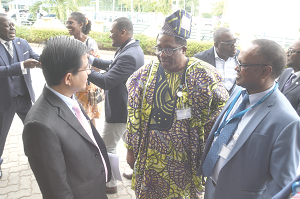
Stakeholders discuss ways to minimise Avian Influenza risk in sub-region
Stakeholders in the food and agricultural sector in the ECOWAS region have converged on Accra to discuss ways to minimise the risk of Highly Pathogenic Avian Influenza (HPAI) occurrence and spread in the region.
Participants in the four-day meeting will discuss ways to update the HPAI control strategy at the regional and national levels.
Other strategies include assisting countries to develop national biosecurity action plans, strengthening capacity of ECOWAS member states and the Regional Animal Health Centre (RAHC) on incident management.
HPAI
The highly contagious disease subtype H5N1, which mostly affects poultry, was first confirmed in commercial poultry flocks in Nigeria in February, 2006.
Within six months, the virus had spread across the region with outbreaks confirmed in eight countries.
By the end of 2007, some countries had effectively controlled the infection and, therefore, there was no new reported cases of avian influenza outbreak in the region in 2008.
However, after seven years, the infection re-emerged in 2015 due to the H5N1 in domestic poultry and H5N8 subtypes in migratory birds in Nigeria.
The catalogue of events since the first incursion in 2006 revealed a recurrence of the infection, necessitating the consultative meeting which began in Accra yesterday.
The workshop was organised by the Food and Agriculture Organisation (FAO), in collaboration with the ECOWAS Commission and supported by USAID.
Re-emergence
The West and Central Africa Regional Manager of the Emergency Central for Transboundary Animal Disease of the FAO, Abebe Wolde, said cases of avian influenza H9N2 subtype reported in 2018 had not been effectively controlled as outbreaks were reported from Ghana, Benin, Côte d'Ivoire and Senegal.
He said in 2021, outbreaks were also confirmed in Burkina Faso, Niger, Côte d'Ivoire, Ghana, Togo, Benin and Mali, resulting in the mortality and destruction of huge numbers of poultry.
“The current wave of infection spreading rapidly was as a result of poor implementation of on-farm biosecurity measures, weak national animal health delivery systems compounded by poor public sensitisation, inefficient disease detection and control at the borders, lack of government support and timely compensation,” Mr Wolde added.
He also mentioned reluctance of poultry farmers to report suspected cases on time and the uncontrolled and secret vaccinations of poultry as some of the causes.
Mr Wolde, therefore, called for a concerted effort to ensure the control of HPAI in the region to safeguard public health, improve poultry production and protect livelihoods.
Compensation
In a speech read on behalf of the Minister of Food and Agriculture, Bryan Acheampong, the Chairman of the Veterinary Council of Ghana, Dr Jonathan Amakye-Anim, said the country recorded its first HPAI outbreak in 2007 and 2015, with 148,000 birds being destroyed as part of containment measures by the Veterinary Services Directorate (VSD).
He said there was also loss of livelihoods which resulted in the government paying a total of GH¢16 million in compensation to 114 farms affected by the HPAI in 2021.
The chairman added that an emergency fund was created in 2015 for the procurement of needed resources to help reduce the exposure of the poultry industry to disease outbreaks.
The minister mentioned common risk factors associated with the outbreaks of HPAI in the country as wetlands, forest reserves and water bodies.
The WHO representative to Ghana, Dr Francis Kasolo, in a speech read on his behalf, underscored the need to strengthen coordination of preparedness and response actions of HPAI, including fostering good emergency management practices and collaborative surveillance of influenza viruses and market sectors.
For his part, the FAO Representative to Ghana, Yurdi Yasmi, described the workshop as timely, and expressed the FAO’s commitment to support member countries to minimise the spread and impact of HPAI and other transboundary diseases.
